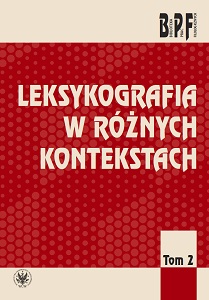Bóg musi być kulą. Czy przykłady użycia w internetowym słowniku języka polskiego mogą być: interesujące – zabawne – kontrowersyjne?
God must be a sphere. Can usage examples in the Internet dictionary of Polish language be: interesting – funny – controversial?
Author(s): Łukasz Szałkiewicz
Subject(s): Theoretical Linguistics, Applied Linguistics, Philology
Published by: Wydawnictwa Uniwersytetu Warszawskiego
Keywords: lexicography; usage examples; sources; language corpora
Summary/Abstract: The editor of an online dictionary (where the lexicographer is not limited by the amount of space) can give full- or even multi-sentence usage examples. He can also assume that he only records authentic examples. In order to encourage the user to look into them, he can add one more assumption: let these examples be interesting, let them bring additional knowledge, be funny, intriguing, maybe even controversial. Such assumptions, adopted in the work on the popular science “Good dictionary” (available at dobryslownik.pl), give rise to many additional issues and problems. In the article, the author focuses on three issues: 1. how an usage example can convey additional knowledge (in particular, supplement the defi nition), 2. why a funny example is better than some other, 3. should we avoid recording characteristic usage examples, in which it is mentioned that, for example, (in italics, words-dictionary entries) „renault driven by a drunk driver collided …”, that „mother drowned the baby in Dobczyn”, that „Gwóźdź was sentenced to life imprisonment”, etc.
Book: Leksykografia w różnych kontekstach. Tom 2
- Page Range: 259-271
- Page Count: 13
- Publication Year: 2020
- Language: Polish
- Content File-PDF

